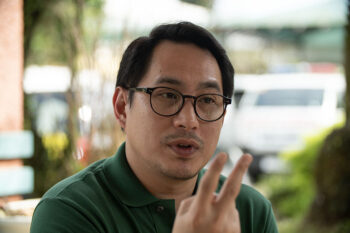DAVAO CITY (MindaNews/06 September) — In his talk on peace movements and the UN during the 2014 International Peace Research Association (IPRA) conference in Istanbul last month, Emeritus Research Fellow Unto Vesa of the Tampere Peace Research Institute in Finland raised questions on the relevance of UN peacekeeping. It probably was not the first time the criticism was raised. As if on cue, Nihon University peace historian Klaus Schlichtmann followed up with his take on how in 1950 the UN missed the opportunity for transitioning to collective security. These two eminent scholars made their case on the missed opportunities in the past and the debatable relevance of present UN peacekeeping operations.
Take for example the Golan Heights.
When the smoke cleared after the Six-Day War in 1967, Israel ended up expanding the Jewish state with its occupation of the Golan Heights, along with the Gaza Strip and the West Bank. In 1973, Syria unsuccessfully tried a surprise attack to win the Golan Heights back. The hostilities required the UN to step in, and on 31 May 1974, the UN Security Council resolution 350 established the UN Disengagement Observer Force (UNDOF) to “maintain the Ceasefire between Israel and Syria; supervise the disengagement of Israeli and Syrian forces; and supervise the areas of separation and areas of limitations,” as provided in the Agreement on Disengagement.
The UNDOF therefore is a mechanism intended to prevent conflict between states. The UNDOF has been so good at what it does that it recently celebrated 40 years of peacekeeping in the region. But obviously, 40 years of conflict prevention does not necessarily mean a decisive conflict resolution.
The UNDOF is so good at what it does that it has been doing just that for over forty years now. In the course of operating this security creating mechanism “for the fulfillment of a just and lasting peace in the Middle East”, the UNDOF had lost 54 peacekeepers. That number could have been increased by casualties from the 40 Filipino peacekeepers who for seven hours on 31 August had defended their position on location 68 against intense and concentrated attack mounted by about a hundred anti-government armed elements.
Reports have it that the hostile forces used anti-aircraft munitions and had actually breached the gates using three trucks. Despite the considerable force of the assault, it now appears that the UNDOF leadership had advised our embattled troops not to retaliate, but to instead “leave their guns silent”.
Maybe it’s a cultural thing for us Filipinos to understand “silent” to go unheard. Maybe in the heat of the moment when their very lives were being threatened, the message that got through to our troops was for them to “leave their guns”.
In that case, oh, most definitely not.
I don’t know exactly what a UN peacekeeper is, but I bet it is not someone who goes to the war zone armed with a white flag on a mission to deliver himself and his gun at mercy of the hostile forces. Maybe I should ask a Fijian peacekeeper what a UN peacekeeper is. I doubt though that any among the 44 Fijian peacekeepers who surrendered last week to the hostiles would be able to answer my question any time soon.
The Philippines surely does not lend its troops to the UNDOF for them to demurely sit out seven hours of anti-aircraft fire. Surely, our boys have a right to defend themselves and the UN installation where they are located. And surely, when they run out of ammunition, the prudent thing would be to withdraw. Any commander worth his salt would know that. How can you defend when you are – for all intents and purposes – defenseless? You mount the great escape while the hostiles are distracted and regrouping.
That makes sense to me.
Still, I’m no force commander.
So in the last 24 hours, I had been trying to reach the former UNDOF commander, retired general Natalio Ecarma III, who is now with the Department of National Defense. I wanted to ask him whether the UNDOF commander has the authority to order the troops of a cooperating nation to surrender. I also wanted to ask him whether what could be construed as our troops’ defiance of the UNDOF commander’s directive to surrender would have any negative repercussion on the Philippines’ commitment to UN peacekeeping.
I called on the dot at the times he set today but he wasn’t picking up.
Finally, past 5 pm, he texted me his third apology, pleading a busy day. We did get to talk before the sun came down, but the signal was so bad, like he was taking the call within range of a signal scrambler. I’d lost half of what General Ecarma said, except the part where he asked me not to ask him sensitive questions. That one I got on audio record, loud and clear.
So scrap question number one. And forget asking for a comment on a UN mission statement released hours earlier charging him of interfering in the decision making mechanics of the UNDOF and insinuating that our troops are unmotivated, low-performing, and disobedient of the UNDOF chain of command.
Apparently, Ecarma is of the opinion that our troops did not violate the rules of engagement, as they fired their weapons “to defend themselves when their lives (are) in danger”. While the Philippines remains committed to the cooperation among nations for global security, Ecarma firmly insists that “the safety and security of our peacekeepers remain paramount.”
He reminds that, “Their safety and security is to our national interest. Pinahiram lang natin sila sa UN.”
Surely, when we lend what’s ours, we have a right to expect that the borrower would take very good care of the loaner.
A day before (4 September), I had a leisurely phone chat with fellow Ilongo Peacekeeping AFP Operation Center commander Colonel Roberto Ancan, the former 66th Infantry Battalion commander in New Bataan and chief of staff of the First Scout Ranger Regiment. Yeah, Bob and I go way back.
We talked about the 332-strong Philippine peacekeeping contingent in the Golan Heights. He said this was the first time that this batch of peacekeepers was involved in armed hostilities in the eight months since it had been deployed on this mission. Our troops, he said, “fought with the finest tradition of the Filipino soldier” that resulted in “no casualty”.
Bob turned Ilongo when I asked him about the UNDOF commander’s advice to “lay down their arms and wave the white flag” so as to “gain safe passage”: “Ay, indi gid ina ya puede, ma’m. How can we be sure? We don’t know their intent.”
And they’re firing heavy guns at us! What other intent could there be?!!
So our boys wriggled out of that insecure corner leaving no man behind.
“None at all,” he assured. “They are all well and unharmed and have already contacted their families to assure them of their safety.”
By then, the Philippine troops had been repositioned in various locations, with only 83 of them remaining in position 80 in the area of separation near the Israel side.
I had asked Ancan whether we were expecting any tensions over the perceived defiance by our troops of the UNDOF commander’s orders. He said no. He said our troops had to do what they had to do. But the next day, the UN mission sent out a statement that disagreed with Ancan’s opinion.
The Philippine forces are to be withdrawn from the UNDOF this October. Some weeks back, this decision had been conveyed to the UN mission. Ancan explained that the decision to withdraw was based on the changing playing field in the Golan Heights when even the UN peacekeeping troops are being dragged into the fighting.
I have to agree. We can’t stay to referee when the players refuse to recognize the rules of our game. The UNDOF commander Lieutenant General Iqbal Singh Singha is of course welcome to keep on following his UN rule book, well past the time when the players in the Golan Heights had obviously changed the rules of the game. I’ll sew him a white flag and wish him well on his belief that the hostiles would give him safe passage when he waves it.
That’s the thing about rule books. Spelling it out in black and white limits the user’s understanding of the many ways things can go SNAFU. And when they do, he takes his chances in uncharted places where he has no control, no security.
I bet if we ask them, that is not what the Fijian peacekeepers signed up for.
It definitely is not what the Philippine peacekeepers signed up for.
Prof. Schlichtmann will probably agree with me. It does sound like UN 1950 all over again. (Wayward and Fanciful is Gail Ilagan’s column for MindaViews, the opinion section of MindaNews. Ilagan teaches Social Justice, Family Sociology, Theories of Socialization and Psychology at the Ateneo de Davao University where she is also the associate editor of Tambara. You may send comments to gail.ilagan@gmail.com. “Send at the risk of a reply,” she says.)







